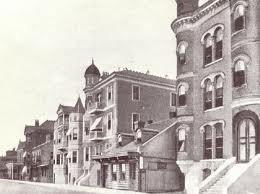JUNKYARD DOGS
CRAIG JOHNSON
 As a suffocating heat wave wraps it’s humid tentacles around the denizens of the middle latitudes and winter is thankfully a dim memory one can imaginatively slide into a Wyoming bone chilling winter along with Walt Longmire and his crew of friends and fellow law enforcement officers of Absaroka County.
As a suffocating heat wave wraps it’s humid tentacles around the denizens of the middle latitudes and winter is thankfully a dim memory one can imaginatively slide into a Wyoming bone chilling winter along with Walt Longmire and his crew of friends and fellow law enforcement officers of Absaroka County.
As in any town there are people who actions defy belief but that make perfect sense to them and the story begins with Walt trying to figure out why a grandfather in his seventies has ended up in a ditch after having been towed a few miles by a car. I know people like this, you know people like this and so you settle in for this winter’s tale.
 Walt is tired and as cold as the winter for several reasons. His daughter Cady had returned to the east to plan her wedding, for some reason leaving him out of the loop, one of his best officers is having second thoughts about his career, he has worries about his health that he is trying to suppress and lastly he won’t let go and have the relationship he wants and needs in his love life. As always he suppresses all his concerns in the job and the job always comes through.
Walt is tired and as cold as the winter for several reasons. His daughter Cady had returned to the east to plan her wedding, for some reason leaving him out of the loop, one of his best officers is having second thoughts about his career, he has worries about his health that he is trying to suppress and lastly he won’t let go and have the relationship he wants and needs in his love life. As always he suppresses all his concerns in the job and the job always comes through. The case this time involves an unusual death at a junkyard guarded by two vicious animals of great reputation. The corpse is old George Stewart himself who was recently smacked in the head by a golf club swung by an irate neighbor who lost his temper. But this isn’t what killed the old man. Before many days follow the bodies are dropping like dominoes and the thread that ties them together is hard to find.
The case this time involves an unusual death at a junkyard guarded by two vicious animals of great reputation. The corpse is old George Stewart himself who was recently smacked in the head by a golf club swung by an irate neighbor who lost his temper. But this isn’t what killed the old man. Before many days follow the bodies are dropping like dominoes and the thread that ties them together is hard to find.
Walt has to look within families to try and find connections and he unearths secrets that are deeply hidden.
There are always many kinds of people that live in any community. Those that have been there for ages and those who saw the potential of the area and come to change it. This does not always make for peace. The way to make progress is to try to appreciate the things that look good on the surface but are not what they seem.
As in any community there is that ubiquitous junkyard surrounded by that chicken wire fence that is an eyesore but it provides an essential service. No one wants it in his or her neighborhood and everyone is afraid of the guard dogs. It is a symbol of the other side of the tracks. This sounds more like a big city or town concept, at least a place with tracks, not the wide-open spaces of Wyoming kind of separation. But people are the same everywhere with a Craig Johnson kind of twist.
There is a moral to this story. It is that problems are best faced straight on whether they be people with criminal tendencies, family difficulties, physical problems, medical issues or junkyard dogs or you may get bitten in the a$$.
I can always count on Craig Johnson to tell a great tale and bring me into his Wyoming world for several hours. This was a great trip.

















































